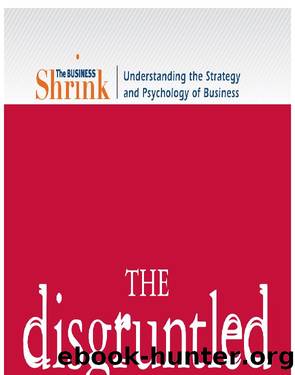The Business Shrink--The Disgruntled Employee by Peter Morris

Author:Peter Morris
Language: eng
Format: epub
Tags: ebook, book
Publisher: Adams Media
Published: 2008-02-14T16:00:00+00:00
Document All You Do
It is critical to document every consequential managerial interaction you have with your employees. Whether itâs a performance evaluation, a raise or promotion, a disciplinary conversation or letter, everythingâI repeat, everythingâneeds to be in writing. Follow up all of your substantive communicationsâletters, memos, notes, emailsâ with employees by documenting them with a file memo just in case you have to prove these exchanges actually occurred.
Have a Witness to Conversations
If you need to have a conversation with an employee about a subject that may concern sensitive issues such as work performance or mental health, do not talk to the employee alone, especially if you are a male supervisor with a female employee, or vice versa. For example, letâs say that some of your staff members have complained that a coworker has been making sexually suggestive remarks that are making them uncomfortable. Since this goes against your organizationâs no-tolerance policy for sexual harassment, you want to deal with the situation immediately. Even if there is no specific company policy, you must act, both because the law may have been violated and because you want no disruptive behavior in your workplace. You schedule a meeting with the problem employee. Do you need a witness? You bet your bottom dollar you do.
What if when you schedule the meeting, the accused worker says he wonât come without a coworker present? Most companies do not have to agree to this request unless a collective bargaining agreement mandates it. While nonunion employees have the right to ask for the presence of a witness at any disciplinary meeting or interview, the company isnât required to honor the employeeâs request. This issue arose from a 1975 case in which the U.S. Supreme Court ruled that union-represented employees had the right to bring a union representative to any investigatory meeting that might result in disciplinary action. Following that ruling, nonunion workers began to request the right to bring a coworker or even an attorney into meetings with their supervisors if they felt the interview could lead to discipline.
There is no legal requirement that you honor such a request. But no matter the law or the sensitivity of the agenda, it may make both you and the problem worker more comfortable to have a witness there.
Consider meeting with the troubled employee along with a human resources manager. If your organization doesnât have an HR department, ask another supervisor or manager to sit in on the meeting. Let the employee know why you are doing this, and get the other managerâs promise to keep the issue private. If privacy is a special concern, make each party sign a confidentiality agreement. If there is no appropriate supervisor available, have another member of your staffâsay, your assistantâact as a witness to any sensitive confrontations. The accused worker cannot legally demand a witness (unless heâs represented by a union), so he certainly cannot dictate who the witness is going to be. If your assistant or some other management staffer is in the
Download
This site does not store any files on its server. We only index and link to content provided by other sites. Please contact the content providers to delete copyright contents if any and email us, we'll remove relevant links or contents immediately.
Zero to IPO: Over $1 Trillion of Actionable Advice from the World's Most Successful Entrepreneurs by Frederic Kerrest(4503)
Machine Learning at Scale with H2O by Gregory Keys | David Whiting(4292)
Never by Ken Follett(3935)
Harry Potter and the Goblet Of Fire by J.K. Rowling(3845)
Ogilvy on Advertising by David Ogilvy(3599)
Shadow of Night by Deborah Harkness(3356)
The Man Who Died Twice by Richard Osman(3070)
Book of Life by Deborah Harkness(2929)
The Tipping Point by Malcolm Gladwell(2910)
Will by Will Smith(2906)
0041152001443424520 .pdf by Unknown(2843)
My Brilliant Friend by Elena Ferrante(2824)
Purple Hibiscus by Chimamanda Ngozi Adichie(2812)
How Proust Can Change Your Life by Alain De Botton(2803)
How to Pay Zero Taxes, 2018 by Jeff A. Schnepper(2646)
Hooked: A Dark, Contemporary Romance (Never After Series) by Emily McIntire(2544)
Rationality by Steven Pinker(2350)
Can't Hurt Me: Master Your Mind and Defy the Odds - Clean Edition by David Goggins(2319)
Borders by unknow(2301)
